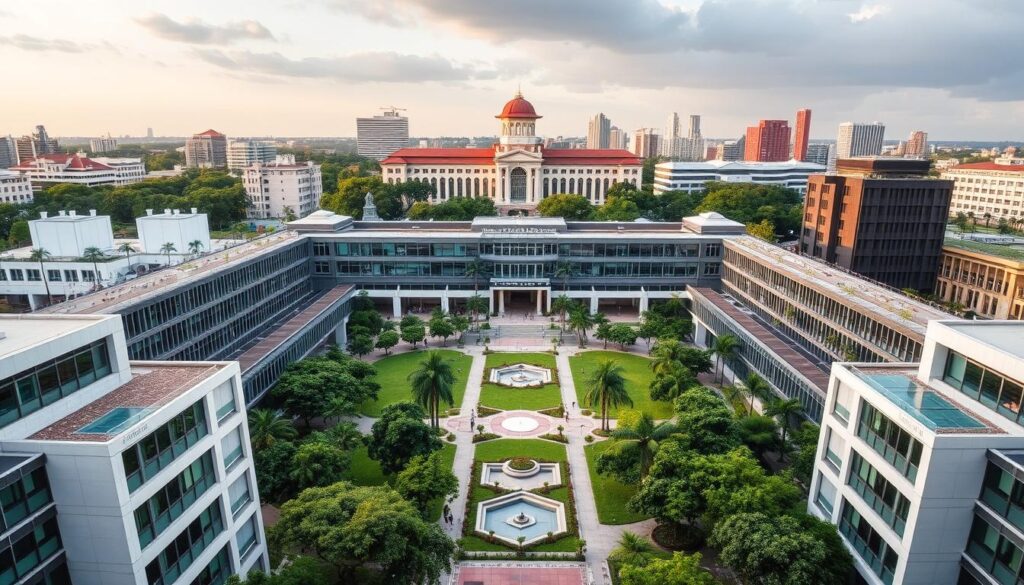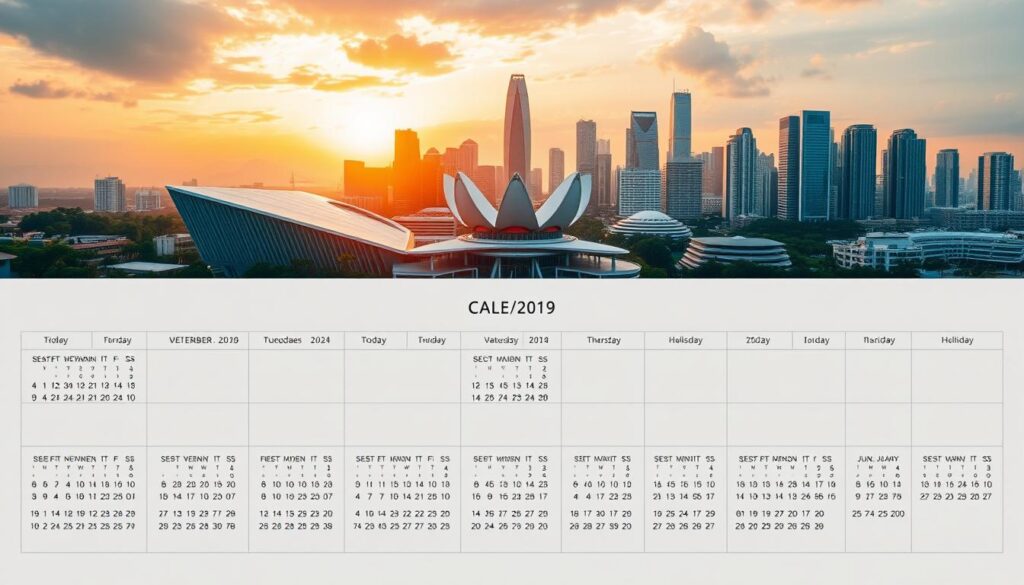Singapore is known for its strong education system, and its polytechnics play a big role. These schools offer hands-on learning that prepares students for real-world careers. With modern facilities and strong industry ties, they help graduates succeed.
This guide compares top institutions based on key factors. We look at course variety, campus life, and career support. Each school has unique strengths, from engineering to business programs.
Practical training is a focus across all polytechnics here. Students gain skills through labs, internships, and projects. Many programs partner with leading companies for work experience.
Key Takeaways
- Singapore’s polytechnics focus on career-ready skills
- Schools differ in program specialties and facilities
- Industry partnerships provide valuable work experience
- Graduate success rates help compare institutions
- Campus culture varies between polytechnics
Introduction to Polytechnics in Singapore
Education pathways in Singapore offer diverse options for students seeking hands-on learning. Among these, polytechnics stand out as institutions that blend classroom knowledge with real-world application. They provide a dynamic environment where students develop both technical expertise and soft skills.
What Is a Polytechnic?
A polytechnic is a tertiary institution that bridges academic theory and vocational training. Unlike traditional universities, these schools emphasize project-based learning and industry collaboration. Students typically complete a three-year diploma program with coursework tailored to specific career fields.
Key features include:
- Practical training through labs, workshops, and internships
- Smaller class sizes for personalized attention
- Direct pathways to employment or further studies
Why Choose a Polytechnic?
Opting for a poly education offers several advantages. The curriculum is designed with industry needs in mind, ensuring graduates possess relevant skills. Many programs include final-year internships at top firms like OCBC, DBS, and EY.
Additional benefits:
- Lower weekly class hours (20 vs. 35 in Junior Colleges)
- Multiple entry points—direct workforce access or university progression
- Recognized diplomas by institutions like NUS and NTU
According to recent data, 17% of poly graduates advance to local universities, while 75% of JC students do. However, many choose immediate employment due to strong industry demand. For a deeper look at programs, check this polytechnic overview.
Polytechnic vs. Junior College: Which is Right for You?
Choosing between a polytechnic and junior college (JC) is a big decision for students in Singapore. Both paths offer unique learning experiences and career options. Understanding the differences helps students pick the best fit for their goals.
Financial Considerations
Cost plays a major role in education choices. Junior colleges have lower annual fees (around $200), while polytechnics cost over $3,000 per year. However, polys offer flexible payment plans through CPF education schemes.
Additional expenses to consider:
- JC students pay standard student transport fares
- Poly students need a $50/month concession pass
- Poly graduates often save on university modules through credit transfers
Program Length and Focus
JC programs last two years and focus on academic theory for university prep. Polytechnics offer three-year programs (four with PFP) centered on hands-on training.
| Feature | Junior College | Polytechnic |
|---|---|---|
| Duration | 2 years | 3-4 years |
| Learning Style | Lecture-based | Project-based |
| Assessment | Exam-focused | Practical assignments |
| Class Structure | Uniform required | Casual dress code |
Stress and Time Management
JC students face intense exam pressure with frequent tests. Polytechnics use continuous assessment through projects and presentations.
“The project deadlines in poly keep me busy, but it’s less stressful than JC exam weeks,” shares a current student. Many polys also offer relaxation spaces like lifestyle libraries to help students unwind.
For more insights on comparing these education paths, check this detailed comparison of JC and polytechnic systems.
Top 5 Polytechnics in Singapore
Five standout institutions shape Singapore’s applied education landscape with distinct strengths. Each school ranks highly in Webometrics global evaluations while specializing in different fields. Their cutting-edge facilities and industry partnerships create varied learning environments.
1. Singapore Polytechnic (SP)
Established in 1954, Singapore Polytechnic dominates engineering education with 37 diploma programs. Its 38-hectare campus houses 11 specialized schools, including the renowned Singapore Maritime Academy. Entry requirements range from 8 to 22 cut-off points across disciplines.
2. Ngee Ann Polytechnic (NP)
As a pioneer in media education, Ngee Ann Polytechnic offers 39 courses with film production studios and 987FM campus radio. The Olympic-size swimming pool supports sports science programs. Students typically need between 8 to 26 points for admission.
3. Temasek Polytechnic (TP)
The only major institution in eastern Singapore, Temasek Polytechnic excels in niche fields like forensic science and game design. Its 37 programs maintain competitive 8-21 point thresholds. The campus features specialized law and design facilities unmatched elsewhere.
4. Nanyang Polytechnic (NYP)
Nanyang Polytechnic leads in information technology with advanced cybersecurity labs and AI research centers. The school’s industry collaborations provide real-world tech experience. Students benefit from strong ties to Singapore’s growing digital economy.
5. Republic Polytechnic (RP)
Known for its Problem-Based Learning system, Republic Polytechnic emphasizes collaborative projects over lectures. The modern campus features simulation labs for healthcare and engineering students. Flexible learning spaces support its innovative teaching methodology.
Singapore Polytechnic (SP): The Oldest and Most Prestigious
Founded in 1954, this institution set the standard for applied education in the region. As Singapore’s first school of its kind, SP combines tradition with modern teaching methods. Students benefit from seven decades of refined curriculum development and industry connections.

Courses Offered
SP’s 11 academic schools deliver specialized programs across emerging fields. The Media, Arts & Design (MAD) school produces creative professionals, while maritime studies anchor the engineering department.
Flagship programs include:
- Diploma in Architecture with BIM certification
- Maritime Engineering with offshore technology focus
- Cybersecurity and Digital Forensics
Facilities and Campus Life
The 38-hectare Dover campus features world-class facilities for learning and recreation. Three Olympic-size swimming pools support aquatic sports, while rock-climbing walls test physical endurance.
| Facility Type | Quantity | Special Features |
|---|---|---|
| Sports Courts | 12 badminton | Retractable seating |
| Maker Spaces | 7 workshops | 3D printing labs |
| Student Lounges | Campus-wide | 24-hour access |
Unique Features
Industry partnerships with Keppel Corp and ST Engineering provide real-world project opportunities. The annual SP Maker Festival showcases student innovations, drawing recruiters from leading firms.
Notable aspects include:
- Startup incubators for student entrepreneurs
- Overseas community projects in 15 countries
- Alumni network including Taufik Batisah
Ngee Ann Polytechnic (NP): A Leader in Film and Media
Creativity meets technology at Ngee Ann Polytechnic, where media studies thrive. This institution stands out for its immersive programs in digital storytelling and visual arts. Students gain hands-on experience with industry-standard tools from day one.
Courses Offered
The Digital Visual Effects diploma leads NP’s innovative courses, featuring VR storytelling modules. Aspiring filmmakers train in 4K production studios rivaling professional facilities. Mediacorp partnerships provide real-world internship opportunities during final-year projects.
Specialized programs include:
- Motion Graphics and Broadcast Design
- Interactive Media with AR/VR focus
- Sound Engineering with Dolby Atmos certification
Facilities and Campus Life
NP’s Lifestyle Library breaks traditional molds with 3D printers and animation suites. Studio27 soundstages host student film shoots, while The Loft@94 offers co-working spaces for collaborative projects.
| Facility | Unique Feature |
|---|---|
| 987FM Radio Station | Live broadcast training |
| Green Screen Studio | Virtual production walls |
| Foley Recording Room | Professional sound effects lab |
Unique Features
NP dominates regional competitions, winning 12 awards at the 2023 Crowbar Awards for student ad campaigns. Industry partnerships with Resorts World Sentosa and Robert Bosch create exclusive project briefs.
Notable achievements:
- Alumnus Anthony Chen’s Cannes Film Festival recognition
- Asia-Pacific ICT Alliance awards for digital media projects
- Annual NP Film Festival attended by industry scouts
Temasek Polytechnic (TP): East Singapore’s Gem
East Singapore’s education scene shines with Temasek Polytechnic’s innovative approach. This school brings specialized programs to students who want hands-on training. Its Tampines location offers easy access to industry partners and entertainment hubs.
Courses Offered
TP stands out as the only institution offering a Diploma in Law & Management. Students gain legal knowledge alongside business skills for diverse career paths.
Other unique courses include:
- Cybersecurity with ethical hacking modules
- Theme Park Management for tourism professionals
- Culinary Science in industry-grade kitchens
Facilities and Campus Life
Future nurses train in simulated hospital wards with lifelike mannequins. The sports complex features a climbing wall and indoor courts for student wellness.
| Facility | Special Feature |
|---|---|
| Culinary Labs | Commercial-grade equipment |
| Design Studios | VR prototyping tools |
| Student Hub | 24-hour study spaces |
Unique Features
TP partners with Changi Airport Group for aviation projects. Students compete in the Singapore Space Challenge, designing solutions for aerospace companies.
Perks include:
- Walking distance to Our Tampines Hub
- Industry mentors from partner firms
- Annual food festival showcasing culinary talents
Nanyang Polytechnic (NYP): The IT Hub
Digital transformation takes center stage at Nanyang Polytechnic’s cutting-edge campus. This institution leads in preparing students for careers in emerging technology fields through immersive learning environments.
Courses Offered
The Diploma in AI & Analytics exemplifies NYP’s forward-thinking curriculum. Students develop practical skills through 40 specialized programs covering:
- Cloud computing with AWS certification modules
- Cybersecurity operations in simulated attack scenarios
- IoT system design using industry-standard platforms
Facilities and Campus Life
The white-themed Ang Mo Kio campus integrates smart facilities for interactive learning. Key features include:
| Facility | Tech Integration |
|---|---|
| Cisco Networking Academy | Live network security simulations |
| AWS Educate Labs | Cloud computing sandbox environments |
| Facial Recognition Systems | Campus access and attendance tracking |
Unique Features
NYP stands out with exclusive industry collaborations. Top performers gain access to IBM’s Quantum Computing systems for advanced projects. The annual Hackathon attracts tech companies scouting for talent.
Notable initiatives include:
- IT Apprenticeship Programme with local startups
- Smart Campus project using sensor networks
- Partnership with GovTech for digital government solutions
Republic Polytechnic (RP): The Modern Approach
Breaking traditional education molds, Republic Polytechnic redefines classroom experiences. This institution stands out with its fully digital teaching environment and innovative problem-solving focus. Students engage with real-world challenges from day one.

Courses Offered
RP provides 45 cutting-edge programs across emerging industries. The Esports Management diploma prepares students for gaming careers, while Biomedical Engineering blends medical science with design principles.
Specialized options include:
- Outdoor Adventure Learning with wilderness certifications
- Aviation Management using flight simulators
- Digital Health Technology for future clinics
Facilities and Campus Life
The Woodlands campus features industry-grade training spaces. All areas have air-conditioning for comfortable year-round learning.
| Facility | Feature |
|---|---|
| Aviation Simulation Centre | Full cockpit replicas |
| RP Sports Arena | Olympic-standard track |
| Digital Library | 24/7 online resources |
Unique Features
RP’s Problem-Based Learning (PBL) system replaces lectures with daily case studies. “We solve actual industry problems in teams,” explains a current student. This method develops critical thinking and collaboration skills.
Key advantages:
- Paperless system with open-book digital exams
- Industry partnerships with Singapore Airlines
- Early graduation options for top performers
Comparing the Best Polytechnics in Singapore
Different learning environments thrive across Singapore’s applied education institutions. Each school offers unique advantages that appeal to various learner profiles. Understanding these differences helps students make informed choices about their future.
Cut-Off Points and Admission Requirements
Entry standards vary significantly between institutions and programs. Competitive courses like SP’s Mechanical Engineering demand single-digit L1R4 scores, while creative fields may accept broader ranges.
| Institution | 2025 Cut-Off Range | Most Competitive Program |
|---|---|---|
| Singapore Polytechnic | 8-22 points | Architecture (8 points) |
| Ngee Ann Polytechnic | 8-26 points | Film Studies (10 points) |
| Temasek Polytechnic | 8-21 points | Law & Management (9 points) |
| Nanyang Polytechnic | 7-26 points | Cybersecurity (7 points) |
| Republic Polytechnic | 13-26 points | Biomedical Engineering (13 points) |
GPA calculations also differ slightly between polytechnics. Most use a 4.0 scale, but weighting for practical assessments varies by institution.
Popular Courses and Specializations
Program popularity often reflects industry demand and institutional strengths. SP dominates engineering fields, while NYP leads in technology-related courses.
Current enrollment trends show:
- SP’s Architecture program receives 8 applicants per seat
- NP’s Film Studies attracts creative talent nationwide
- NYP’s Cybersecurity sees 40% annual enrollment growth
Specialized facilities often determine program appeal. TP’s culinary labs and RP’s aviation simulators create unique learning experiences.
Campus Culture and Student Life
Each institution cultivates distinct environments that shape the student experience. NP’s media focus fosters creative expression through film festivals and radio stations.
Contrasting campus vibes:
- SP: Industry-focused with corporate partnerships
- NP: Arts-driven with vibrant creative community
- RP: Sports-oriented with elite athletic facilities
“The energy at NP’s annual film festival feels like a professional industry event,” shares a current media student. Such events provide networking opportunities beyond classroom learning.
Understanding these differences helps prospective students find their ideal match among Singapore’s diverse polytechnics.
What to Consider Before Choosing a Polytechnic
Making the right education choice requires understanding key academic structures. Different institutions offer varied learning approaches that affect your daily experience and career outcomes. Three critical factors deserve special attention when evaluating options.

Academic Year and Semester Structure
The academic year runs from April to April across most institutions. This unique schedule divides into two main semesters with short breaks between. Some schools offer additional elective courses during holiday periods.
Key features include:
- Mid-semester breaks in September and March
- Final year projects spanning both semesters
- Flexible timetables with morning/afternoon slots
Examination and Grading System
Assessment methods vary significantly between schools. Republic Polytechnic uses continuous project evaluations instead of traditional exams. Other institutions follow a modular system with four assessments per year.
Important considerations:
- Mid-semester tests account for 30% of grades
- Practical components weigh heavily in technical subjects
- Failing modules requires retaking at $3,000+ per term
Internship and Training Opportunities
All programs include mandatory work attachments lasting six months. Leading companies like DBS and SIA host students for real-world experience. Some institutions offer global programs through Overseas Immersion Projects.
Notable opportunities:
- Industry projects with actual client briefs
- International exchanges to partner universities
- Career fairs with direct recruitment options
Prospective students should evaluate these factors alongside personal learning preferences. The right combination leads to both academic success and professional readiness.
Orientation and Student Life in Polytechnics
The transition to polytechnic life brings exciting new experiences beyond the classroom. Each institution welcomes newcomers with vibrant orientation programs designed to build connections. These events help students adjust to campus culture while discovering available resources.
What to Expect During Orientation
First weeks typically feature team-building activities and campus tours. Ngee Ann Polytechnic’s overnight camps create bonds through challenging group tasks. Most schools host CCA fairs where clubs showcase their unique offerings.
Common orientation elements include:
- Interactive ice-breaker games to meet peers
- Faculty introductions and program overviews
- Survival guides for academic success
Extracurricular Activities and Clubs
Singapore Polytechnic boasts over 100 clubs, including an underwater robotics society. Nanyang Polytechnic’s Ethical Hacking Group attracts tech enthusiasts, while Temasek’s Gastronomy Circle explores culinary arts.
Unique opportunities across campuses:
| Polytechnic | Special Interest Group |
|---|---|
| NP | Campus Radio Broadcasting |
| RP | Esports Competition Team |
| TP | Outdoor Adventure Club |
Balancing Academics and Social Life
Successful students recommend setting weekly schedules that include study blocks and leisure time. “Joining one sports team and one academic club creates perfect balance,” shares a third-year business student.
Mental health resources available:
- 24/7 counseling hotlines
- Stress management workshops
- Peer support networks
Polytechnic studies become more rewarding when combined with meaningful campus involvement. The right mix of academics and activities prepares graduates for both careers and personal growth.
Financial Aid and Scholarships
Paying for education doesn’t have to be stressful with the right financial help. Singapore offers various support options to make polytechnic studies affordable. From government grants to school-specific awards, students can find solutions that fit their needs.

Available Financial Support
The MOE Tuition Grant reduces fees significantly for Singaporean citizens. This subsidy can lower annual costs by up to 75%, making education more accessible. Many poly institutions also offer their own bursaries and scholarships.
Key financial aid programs include:
- CDC/CCC bursaries for low-income families
- SAFRA scholarships for military families
- NP’s $10k merit awards for L1R4 scores ≤10
- Industry-sponsored grants from partner companies
How to Apply for Scholarships
Most entrance scholarships have March deadlines, right after O-level results. Applications typically require academic records, recommendation letters, and personal statements. Some awards may include interviews or additional tests.
| Scholarship Type | Application Period | Requirements |
|---|---|---|
| Academic Excellence | Jan-Mar | Top 10% of cohort |
| Sports/Talent | Year-round | National team representation |
| Community Service | Apr-May | 100+ volunteer hours |
Tips for Managing Expenses
Smart budgeting helps stretch your education dollar further. The POSB SmartStudent card offers discounts on transport and meals. Many campus facilities like libraries and gyms are free to use.
Money-saving strategies:
- Buy used textbooks from seniors
- Use student meal deals at food courts
- Take advantage of free software licenses
- Consider part-time work as lab assistants
“Working campus events helped cover my monthly expenses,” shares a current student. Many schools hire students for flexible roles that fit around class schedules.
Career Prospects After Polytechnic
Graduates enter diverse fields with valuable hands-on experience from their applied education. The 2025 Graduate Employment Survey shows 92% of diploma holders secure jobs within six months. This success stems from industry-aligned training that develops in-demand skills.
Thriving Industries for Graduates
Certain sectors actively recruit polytechnic alumni for their technical competencies. Top hiring fields include:
- Infocomm – Cybersecurity specialists and cloud engineers
- Healthcare – Medical technologists and therapy assistants
- Engineering – Aerospace technicians and robotics experts
Continuing Education Pathways
Many graduates advance to local universities through specialized routes. SIT’s Work-Study Degree programs combine employment with part-time studies. NUS offers direct admission for top performers, with credit transfers shortening degree timelines.
| Institution | Admission Route | Credit Transfer |
|---|---|---|
| NUS | Direct Application | Up to 40% |
| NTU | Discretionary Admission | 30% maximum |
| SUSS | Work-Study Program | Modular exemptions |
Alumni Making Waves
Singapore Polytechnic graduate Dr. Lim Wei Xiong now leads SpaceX’s propulsion team. His journey from Mechanical Engineering diploma to aerospace innovator showcases polytechnic education’s potential.
“The project-based learning gave me problem-solving confidence,” shares Dr. Lim. His team recently developed next-gen rocket engines using skills honed during polytechnic lab work.
Tips for Prospective Polytechnic Students
Future poly students can set themselves up for success with these tips. The right preparation makes the transition smoother and more rewarding. Whether choosing programs or adjusting to campus life, early planning pays off.
How to Prepare for Polytechnic Life
Pre-poly workshops offer valuable head starts in key areas. Many institutions provide coding basics and design thinking sessions. These help build foundational skills before formal classes begin.
Essential abilities to develop include:
| Skill Area | Recommended Tools | Practice Methods |
|---|---|---|
| Technical | Python, Adobe Suite | Online tutorials |
| Communication | Presentation software | Classroom speeches |
| Time Management | Calendar apps | Study schedules |
Choosing the Right Course
MySkillsFuture aptitude tests help match interests with suitable programs. Virtual open houses let students explore campuses from home. Talking to current students provides insider perspectives on different courses.
Key selection factors:
- Career outcomes of graduates
- Industry partnerships
- Personal learning style fit
Making the Most of Your Time in Poly
Start strong by focusing on GPA from the first year. Many internship opportunities consider cumulative performance. Networking begins early through LinkedIn profiles optimized for recruiters.
Balanced poly life includes:
- Regular study sessions
- CCA participation
- Industry event attendance
Remember that three years pass quickly. Each semester builds toward graduation and career readiness. Smart choices today create better opportunities tomorrow.
Conclusion
Finding the right educational path shapes future success in exciting ways. Each institution offers unique strengths for students with different interests and learning styles. Campus visits during Open House events help make informed choices.
Align your decision with long-term career goals and personal strengths. The growing tech sector creates high demand for graduates with practical skills. Many industries value hands-on training from these programs.
Consider program specialties, campus culture, and industry opportunities when comparing options. A thoughtful approach leads to rewarding experiences and professional preparation.
This guide highlights key factors to consider when exploring the best polytechnic in Singapore for your needs.



